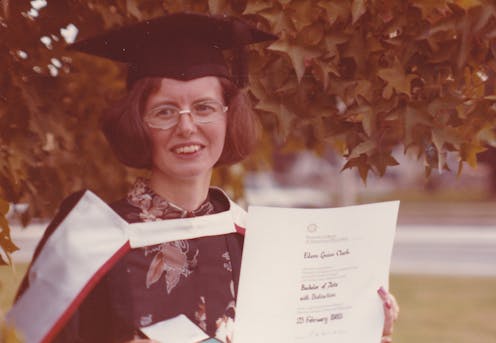'It was the beginning of feminism': how higher education paved the way for the women of Albury-Wodonga
- Written by Portia Dilena, History PhD Candidate, La Trobe University

Regional women are too often forgotten in Australia’s political movements. The “big teal steal” focuses on the independent candidates from Melbourne and Sydney, forgetting that independent Cathy McGowan stole the seat of Indi from the Liberals a decade earlier.
This forgetfulness applies to the Australian women’s movement from the heady 1970s, with the accepted history centring the women who led the movement from the cities.
This neglect of regional women was driven home to me in a series of interviews I conducted with past students of the Albury-Wodonga Study Centre of the Riverina College of Advanced Education (now Charles Sturt University).
The women I interviewed had all been mature-age students of the Study Centre in the 1970s. For all of them, this education offered them a new life.
What stuck out to me in these interviews, was when asked what undertaking study meant to them, many responded “it was the beginning of feminism”.
Women and education
Women had traditionally missed out on the opportunity for a higher education, held back by cost, society’s expectations on the role of women and, for regional women, distance.
Of the women I interviewed, all had missed out on the opportunity of a further education. Jan left school at 15 and travelled with her husband to Papua New Guinea for his career. Ann worked doing “whatever I could to earn enough money” to solely support her six kids.
Once mothers, further education was seen to be a waste of time and money: they had already fulfilled what feminist Anne Summers called their “‘natural’ vocation”.
Read more: Damned Whores and God’s Police is still relevant to Australia 40 years on – more's the pity
Ann recalled that, when she initially enrolled at the Study Centre, she experienced a backlash from her own children who
thought I should have been putting more time into being a mother. All this study business was taking away from what I was expected to do with my life.
The Whitlam Government’s free education initiative removed the financial barrier, yet it was the women’s movement’s critique of gender roles that worked to redefine what possibilities were open to women.
Jan explained:
of course the reason I could go, perhaps this isn’t quite true, but I think it was, was because of the Whitlam free education. It was part of the women’s movement […] and so there was really no obstacle in my way.
Education and feminism
Opened in 1972, the Study Centre was to help local professionals upskill. The courses were vocationally focused, ran in the evening and located in the centre of town.
These factors attracted large numbers of Albury-Wodonga women as it accommodated their busy roles as mothers and wives. Speaking to the local paper, centre director Geoff Fairhall attributed this influx to “bored housewife syndrome”.
Fairhall missed the mark. The women were using the Study Centre to radically alter their lives as women, mirroring feminist principles from the period.
First, they developed a community outside of the family home, not tied to their family or marriage. This provided the space for them to engage in a form of consciousness-raising, as they applied their course material to their lives as women.
Jan recalled a psychology class where the women concluded they already knew much of the material as being “guardians of the health of the family” they had already “picked up on those things”.
Eileen simply stated her studies “helped me to look at my own life in a critical way”.
Second, this education had an impact on their lives as women as they developed an intellectual and economic independence.
Encouraged to undertake further study to stop her from “vegetating” at home, Barb opened her own book-keeping business upon graduation.
Reflecting on her study, Barb argued:
having the degree, it gave me that freedom […] I wasn’t stuck working in a full-time, low-paying job like a lot of women my age were.
Lastly, this challenged the highly gendered public and private spaces of regional Albury-Wodonga: women developed new identities not defined by their role as mother or wife.
Summarised by Ann:
studying and graduating and moving into the workforce as a professional, is miles away from being a housewife! The degree gives the woman a chance to take part in society as a real person rather than just being a mum.
The women of the Study Centre may not have led the 1970s Women’s Liberation movement, but they lived it, and through it their lives changed dramatically. It is important this story becomes part of our national history of feminism.
As Eileen told me:
so it was […] really inspiring, all these women who had lived on the farm for 30 years, now were doing something […] It was the beginning of feminism.
Authors: Portia Dilena, History PhD Candidate, La Trobe University





